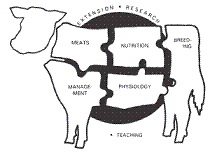Animal Science, Department of

Nebraska Beef Cattle Reports
Date of this Version
2022
Citation
2022 Nebraska Beef Cattle Report
UNL Beef, Institute of Agriculture and Natural Resources, University of Nebraska-Lincoln
Abstract
The objective of this study was to determine the impacts of feeding different ratios of high-moisture corn and steam-flaked corn in diets with or without distillers grains and test for an associative effect between grain processing methods. Steers (n=120; BW=775 ± 15.6 lb) were assigned randomly to one of 8 diets. Diets tested included 100:0, 75:25, 50:50, 25:75, and 0:100 of high-moisture corn:steam-flaked corn in diets with 20% modified distillers grains or 100:0, 50:50, and 0:100 in diets without distillers grains. There was an interaction observed for average daily gain as gain improved in 50:50 blends of HMC:SFC in diets without distillers grains and was not different as grain type changed when distillers grains was in the diet. Feeding modified distillers grains plus solubles increased carcass weight, average daily gain, intake, and fat thickness compared to control diets. Also feeding greater inclusions of steam-flaked corn resulted in an improvement in feed conversion. In conclusion, a possible positive associative effect was observed for a 50:50 blend of high-moisture corn and steam-flaked corn when no byproduct was included in the diet. Including modified distillers grains plus solubles in these finishing diets improved gain when compared to diets without byproducts. Additionally, feeding steam-flaked corn improved conversion compared to high-moisture corn.
Included in
Large or Food Animal and Equine Medicine Commons, Meat Science Commons, Veterinary Preventive Medicine, Epidemiology, and Public Health Commons

